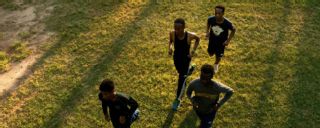|
CLARKSTON, Ga. -- Dubbed "the Ellis Island of the South" and "the most diverse square mile in America" by various publications, this suburb northeast of Atlanta has evolved into a magnet for refugees and immigrants from around the world since the 1990s, and 44 percent of its current population is foreign-born. As a result, the students at Clarkston High School come from more than 50 countries and speak nearly as many languages. Printed images of international flags -- from Congo, Thailand, Pakistan, Ethiopia and others -- hang inside the campus' entryway, a mosaic-like tribute to the student body's origins. The varsity boys' cross country team is a microcosm of the school and the town, with all eight runners on this year's squad having moved to the United States from Africa. In November, three days before the U.S. presidential election, that team won yet another state title. It was Clarkston's third consecutive championship in the sport, and afterward, copies of a photo showing the triumphant runners on the podium decorated the school's front doors. A parade of photos with that image continued through the hallways, with the image hanging from nearly every classroom door. By April, when the runners, their relatives and other Clarkston students made their way to the team's ring ceremony, a few of the photos from November still adorned the walls. Inside the auditorium, where flags from countries around the globe hang from the ceiling, the crowd gathered to celebrate. Rings were awarded to the eight current team members and coaches as well as three runners who had graduated in 2014 -- a symbol of how their second-place performance in the 2013 state meet laid the groundwork for the dynasty that followed. 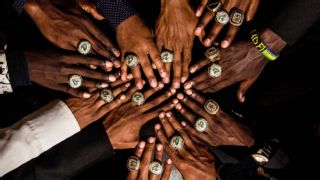 A cursive letter "A," which stands for the Angoras, Clarkston's mascot, is on the face of the rings. On one side, "3 PEAT" and "2014-16" are stacked above the team's two-word mantra that persisted through the year: "WE MATTER." "We don't feel like a certain person or a certain race or color or gender matters," said Wesley Etienne, head coach of Clarkston's cross country and track and field teams. "We -- all human beings -- matter." That's the motto the team carried through the season; it's a philosophy to carry forward. Four of the varsity runners will graduate on Wednesday and move on to college, continuing their American experience. Here are their stories. Hakuzimana Bosco, CongoleseBosco was born in Goma, Congo, but his only memories from Africa are from the Rwandan refugee camp his family moved to when he was 6 years old. He doesn't remember his family's three-day trek -- a combination of walking, paying for a ride and traveling in a United Nations car -- to Gatsibo, Rwanda, as they fled the conflict in Congo. Both of his parents carry reminders of the violence that compelled them to leave their homeland. His father has a deformity in his leg, near his hip, the result of being slammed with a gun. His mother's body is scarred from being stabbed. 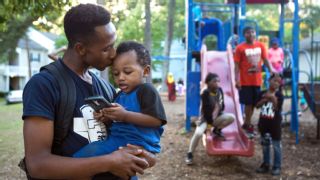 "Basically, when you're in Africa and you hear they're talking about the United States," Bosco, age 19, said, "you feel like you're going to heaven." Bosco was 13 -- he remembers the exact date, Nov. 21, 2011 -- when his family's flight descended into Atlanta around midnight. Initially, he said, it felt like his heart dropped, an unfamiliar sensation since it was his first time traveling by airplane. Then, he was shocked. He could see people outside illuminated by streetlights. In Rwanda after sunset, the world was dark. Bosco's family settled in Clarkston, and his older brother dropped out of school to help provide support. Bosco joined the cross country team as a junior, figuring the coaches would help him stay focused on schoolwork and keep him out of trouble. The plan appears to have worked. 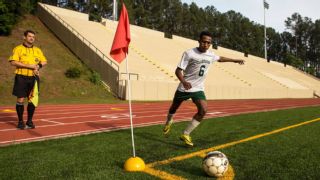 Bosco's next move will be shorter than his last -- around 170 miles to Brewton-Parker College in Mount Vernon, Georgia, where he'll be on a partial soccer scholarship. As the first in his family to go to college, he hopes to set a positive example for others growing up in Clarkston, including his five younger siblings. "I see so many kids around here that don't go to school," Bosco said. "They all ended up in the streets, or they end up in jail. Some of them got shot and died. I feel like I chose school because it was a safe place for me." Suheib Mohamed, SomaliBefore he was born, Mohamed's parents fled from Somalia, and its brutal civil war, to Kenya. His father came to the United States as a refugee in 2000 and eventually became a citizen. In 2011, Mohamed and his siblings joined their dad in the Clarkston area. As a child in Kenya, he and his older brother had shared the daily task of retrieving water from a tap that was five miles from where they lived. Sometimes he made the trek barefooted. When the sun would beat down on the sand in the afternoon, he'd wear socks or makeshift shoes fashioned from a piece of cardboard and rope. 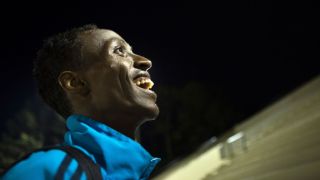 Mohamed didn't like to run while fetching water, but he always did. The faster he finished the job, the sooner he could watch soccer or play it using a ball made of grocery bags burned together. Soccer is still his passion, and he played on his high school team (he and Bosco helped Clarkston reach the state championship game, which the Angoras lost by a goal), but running has taken him places. He was initially intimidated by the words "cross country" when he heard the sport's name on the school announcements. Mohamed wasn't the only immigrant with that reaction, according to Etienne, Clarkston's coach. "They look at me like, 'Dude, I just got to this country. Why would I want to go across the country now?'" Etienne said. When Mohamed began running as a ninth grader, his GPA was a bit low, around a 2.8, he said. Etienne saw two C's when he was checking grades and asked Mohamed what was going on. Mohamed responded with another question.  "GPA -- what is that?" he said. Etienne explained. From then on, Mohamed, who said school "wasn't that important" in Kenya, knew what the academic expectations were in order to compete in athletics. The 18-year-old credits cross country for getting him to where he is now, on the cusp of graduating. Next year he'll run for Savannah State University, where he earned both academic and athletic scholarships. "My mom, my dad encourage me to be better than them," Mohamed said. "They didn't have the education. There were struggles. They want us to help the family." Kon Kon, South SudaneseKon's parents are from South Sudan but moved to Cairo before he was born, and the family came to the U.S. as refugees when he was 6 months old. Many of Kon's family members still live in Africa, and his parents often send them money. Kon worked as a soccer referee until recently, and now he delivers pizzas. He doesn't want to have to ask his parents for money, especially once he begins college. Kon, 18, plans to attend Oxford College of Emory University, a program for first- and second-year students that feeds into Emory University, where he plans to complete his degree in computer science. At Oxford, he'll be only a 40-minute drive away, but it will be his first time living outside the Clarkston area since he arrived in the U.S. as an infant. Being on the Clarkston cross country team is similar to what it's like to live in this community, Kon said. "There's always something new to learn about another culture," he said, adding that he once learned how to speak a few words of Tigrinya so he could talk to an Ethiopian girl he liked in her native language.  The diversity of the team at times sparks questions from those on the outside. "Wow, great job," Etienne recalled hearing at a meet. "Are they eligible?" Shocked, Etienne said he politely responded that his runners had met the required academic standards. For a few weeks, he didn't tell the team about the comment, part of a careful balance between sheltering the kids while also preparing them for what they might face later in life. But they heard the talk, too. Eventually, the athletes came to Etienne with the same question: Are we eligible? Etienne assured them they were. "It just gets really frustrating, you know?" Kon said. "Coach gets really angry at that kind of thing because it's not something that they assumed about any of the other state championship teams. Just us." Bineyam Tumbo, EthiopianTumbo's dad immigrated to the United States from Ethiopia on a diversity visa in 2001 and eventually became a citizen, which allowed Tumbo and his siblings to join him in the Clarkston area in 2009. In a college-application essay, Tumbo reflected on growing up in Africa while his father was in a distant land. He discussed the cross country team and how as a captain he actively recruited other students to join. He also mentioned a concept he learned in biology class -- survival of the fittest. Then, he related that to himself. 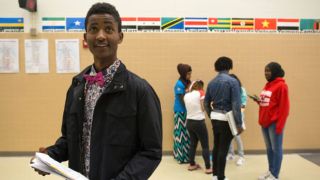 "Even though my struggle for existence has been more difficult than most, I have adapted to life's challenges and thrived in this foreign culture," Tumbo wrote. Thrive he has, both as Clarkston's top finisher at the Class 5A state cross country meet in November, placing seventh overall, and in the classroom. In early May, Clarkston held a celebratory event for its college-bound seniors. Tumbo, who's been accepted at more than 40 colleges, was selected to be the student speaker at the ceremony. The 19-year-old stood in front of his peers on the stage in the auditorium, with the flag of Ethiopia hanging from the ceiling. He opened his speech with a quote about education, and then he told a joke. In conclusion, he asked his fellow students to stand and shout the names of the people who have helped them reach this point. A harmony of indistinct names filled the room, marking the culmination of one academic endeavor and the beginning of another. 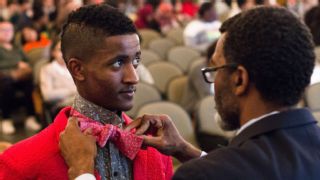 In the fall, Tumbo will get started at Earlham College in Richmond, Indiana, where he will run and plans to major in business. He applied mostly to small schools because he is more at ease in that type of community, and Earlham was an attractive choice because the assistant track and cross country coach is from the Atlanta area, adding to Tumbo's comfort level. If you add up all the scholarships and grants Tumbo was offered, it totals more than $1.5 million. Kamal Carter, a former chemistry teacher at Clarkston who now provides guidance to low-income and disadvantaged students during the application process, says success stories like those of Tumbo and his teammates can help motivate other students who are trying to find their way. "Whatever they become," Carter said, "they become beacons of hope to the kids who say, 'You're just like me.'"
|

